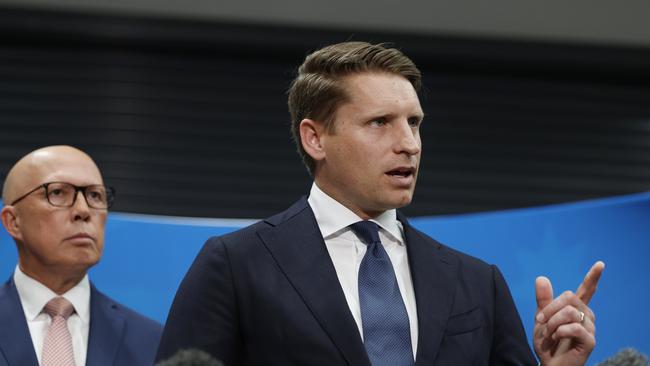
The Coalition says it will make Australia stronger but is refusing to say exactly how it’ll do it.
Its defence policy is remarkably thin on detail and has come too late in the campaign to make much of a difference anyway.
Peter Dutton says he will spend more on defence than Labor – $21bn over five years – and meet the Trump administration’s 3 per cent of GDP target within 10 years.
The promised funding will be welcomed by just about anyone with an interest in the nation’s security, given the defence budget is barely keeping up with inflation – no matter what Richard Marles says.
But what would they spend it on? After nearly three years of attacking Labor as being “weak” on defence, Dutton and his defence spokesman, Andrew Hastie, seem not to have decided.
That’s extraordinary in an election campaign, and suggests they haven’t done the hard work oppositions need to do to present themselves as a credible alternative government. Dutton says in passing that the Coalition would buy more missiles and drones. Which ones? And when would they be delivered?
Ironically, Dutton cancelled the only combat drone that had been on Defence’s books – the $1.3bn SkyGuardian program – when he was defence minister in the Morrison government.
He has promised “massive investment” in Western Australia, the home of Australia’s future AUKUS fleet. On what, precisely?
There was a passing reference to Defence’s recruitment and retention crisis but no word on how the Coalition would fix it.
There was also no mention of the integrated air and missile defence systems, which just about every military expert warns are desperately needed to protect Australian Defence Force units and key bases across Australia’s north.

Dutton defends the lack of detail by saying he can’t sign contracts from opposition but he has already promised (unwisely, many believe) to buy an extra squadron of F-35 joint strike fighters. If he can do that, there’s nothing stopping him announcing other capabilities.
Handing $21bn to Defence without specific instructions on what to spend it on is a disaster waiting to happen.
It’s clearer now why the Coalition has taken so long to release this policy.
More than half a million Australians had already cast pre-poll ballots before it was released, and most others have made up their minds by now on who will get their vote. And the plan as it stands is unlikely to shift much support.
Labor has been derided by some for its decision to keep defence spending at just over 2 per cent of GDP, rising to 2.33 per cent within a decade.
Yet Dutton and Hastie have made the mistake of thinking this is about funding alone. They are leaning far too heavily on the Coalition’s narrow advantage in voters’ minds that it is stronger on national security.

They also appear to be relying on the idea that Hastie, as a former SAS captain, would bring some sort of implicit advantage to the role of defence minister as a result of his military service.
That may be a stretch, given his performance as opposition spokesman. His criticisms of Labor are largely rhetorical, and he has failed to score serious hits on the government by exposing the weakness of its policies.
His personal history also brings political risks: his refusal to walk away from past comments suggesting women were unfit for combat roles is a case in point.
Hastie says he backs the Coalition’s policy that allows women to serve on the frontline, while suggesting they are too weak to do the job because they need to be able to carry a wounded comrade from danger.
That may be true, but it was an unhelpful distraction on top of what is a wider missed opportunity for the Coalition.



